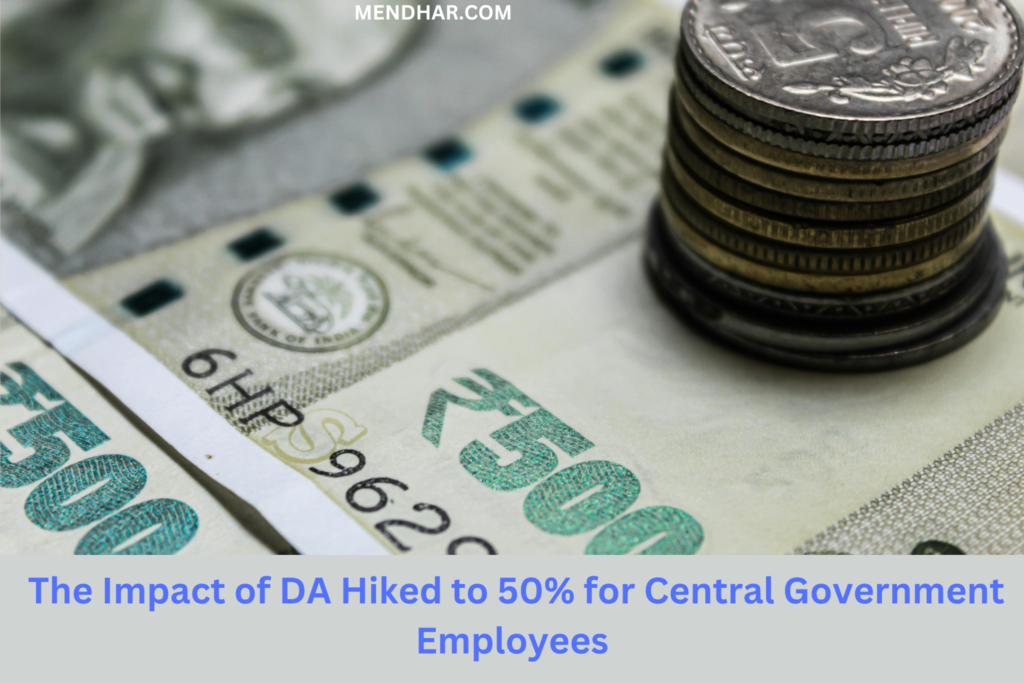Table of Contents
ToggleLet's understand the Impact of DA Hiked to 50% for Central Government Employees:
In a recent development, the Dearness Allowance (DA) has been hiked by 4% to 50% for central government employees, along with an increase in Dearness Relief (DR) by the same margin for pensioners. Effective from January 1, 2024, this revision has sparked discussions about its potential ramifications, particularly regarding whether DA and DR would merge into the basic pay component once DA hits the 50% threshold. However, experts indicate that such a merger is not on the cards, contrary to speculation.

Will DA Merge into Basic Pay?
Despite conjectures, experts like Sanjeev Kumar, Partner at Luthra and Luthra Law Offices, India, assert that the Seventh Pay Commission report does not recommend merging DA into basic pay when it reaches the 50% mark. This sentiment is echoed by Manmeet Kaur, Partner at Karanjawala & Co, emphasizing that the proposed merger lacks support from the Seventh Pay Commission.
Historically, the 5th Pay Commission did recommend merging DA with basic salary once it exceeded the 50% mark, leading to significant changes in 2004. However, subsequent commissions, including the Sixth Pay Commission, steered away from such mergers, as highlighted by Abhishek Awasthi, Partner at RR Legal Partners LLP.
The Impact of DA Hiked to 50% on Salary Structures:
Understanding how the salaries of central government employees will be impacted requires delving into the recommendations of various central pay commissions. The Sixth Pay Commission, for instance, proposed aligning pay adjustments with the moment DA surpasses the 50% threshold, aiming to mitigate the adverse effects of inflation, according to expert opinions.
Shri Venkatesh, Managing Partner at SKV Law Offices, emphasizes that as DA touches 50%, it triggers increases in related allowances such as house rent, daily allowance, and gratuity ceiling, to name a few. These adjustments are crucial for employees to cope with the rising cost of living.
Anticipating Changes: Allowances Set to Increase
Impact of DA Recommendations from Central Pay Commissions:
With DA reaching 50%, several allowances for central government employees are poised to see an uptick. These include:
a) House Rent Allowance
b) Children’s Education Allowance
c) Special Allowance for Childcare
d) Hostel Subsidy
e) TA on Transfer
f) Gratuity Ceiling
g) Dress Allowance
h) Mileage Allowance for Own Transport i) Daily Allowance
It’s important to note that these allowances may vary based on service, city, and specific regulations. Kumar underscores the variability of allowances, which depend on individual components and pay scales.
Table:Impact of DA Recommendations from Central Pay Commissions
| Pay Commission | Recommendations for DA Adjustment |
|---|---|
| Fifth Pay Commission | – Proposed merging DA with basic salary when it crossed the 50% mark. |
| Sixth Pay Commission | – Suggested decoupling pay adjustments from a fixed 10-year cycle. – Recommended aligning adjustments with the moment DA/DR surpasses the 50% threshold. |
The Fifth Pay Commission’s recommendation to merge DA with basic salary when it exceeded 50% led to significant changes in 2004. However, subsequent commissions, notably the Sixth Pay Commission, advocated for a departure from fixed cycles and emphasized the importance of adjusting pay in response to DA/DR crossing the 50% mark.
Conclusion: Navigating Changes with DA at 50%
The recent hike in DA to 50% for central government employees heralds adjustments in various facets of their compensation structure. While speculations abound regarding the merger of DA into basic pay, expert opinions emphasize the lack of support for such a move. As salary structures evolve and allowances increase, employees must stay informed and adapt to the changing landscape to effectively manage their finances and maintain their standard of living.

Frequently Asked Questions (FAQ) - Understanding the Impact of DA Hiked to 50% for Central Government Employees
Q: What is DA, and why is it significant for central government employees?
A: Dearness Allowance (DA) is a component of salary designed to offset the impact of inflation on employees’ purchasing power. It is especially crucial for central government employees as it ensures their salaries remain in line with the rising cost of living.
Q: How much has the DA been hiked for central government employees, and when did this revision take effect?
A: The DA has been hiked by 4% to 50% for central government employees, with the increase in Dearness Relief (DR) for pensioners being similarly adjusted. This revision became effective from January 1, 2024.
Q: Will DA or DR merge into the basic pay component for central government employees now that it has touched the 50% mark?
A: No, the merger of DA or DR into the basic pay component is not automatic when it reaches the 50% threshold. Despite speculation, experts highlight that the Seventh Pay Commission did not recommend such a merger.
Q: Can you provide examples of previous instances where DA was merged with basic pay?
A: Certainly. The Fifth Pay Commission recommended merging DA with basic salary when it crossed the 50% mark, leading to significant changes in 2004. However, subsequent commissions, such as the Sixth Pay Commission, opted against such mergers.
Q: How will the salary structures of central government employees be impacted with DA touching 50%?
A: The impact on salary structures is multifaceted. The Sixth Pay Commission recommended aligning pay adjustments with the moment DA/DR surpasses the 50% threshold, aiming to mitigate the effects of inflation.
Q: What allowances are set to increase as DA touches 50% for central government employees?
A: Various allowances, including House Rent Allowance, Children’s Education Allowance, Special Allowance for Childcare, Hostel Subsidy, TA on Transfer, Gratuity Ceiling, Dress Allowance, Mileage Allowance for Own Transport, and Daily Allowance, are poised to increase.
Q: Are these allowance increases uniform for all employees, or do they vary?
A: Allowance increases may vary based on factors such as service, city, and specific regulations. Individual components and pay scales also play a role in determining the extent of these increases.
Q: How can central government employees stay informed about changes related to DA and its impact on their salaries?
A: Central government employees can stay informed through official communications from relevant authorities, updates from their respective departments, and by seeking guidance from experts in the field of pay commissions and government regulations. Additionally, staying abreast of developments through reputable news sources can provide valuable insights.



Wonderful blog! I found it while browsing on Yahoo News.
Do you have any suggestions on how to get
listed in Yahoo News? I’ve been trying for a while but I never
seem to get there! Cheers